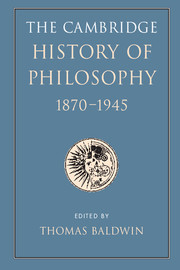Book contents
- Frontmatter
- Contents
- List of contributors
- Introduction
- I 1870–1914
- 1 Positivism, Idealism, and Pragmatism
- 2 Psychology and Philosophy
- 3 Logic, mathematics, and judgement
- 9 Logic: revival and reform
- 10 Foundations of mathematics
- 11 Theories of judgement
- 12 The logical analysis of language
- 4 Philosophy and the new physics
- 5 The idea of social science
- 6 Ethics, politics, and legal theory
- 7 Philosophy of religion and art
- Interlude
- II 1914–1945
- Biobibliographical appendix
- Bibliography
- INDEX
- References
9 - Logic: revival and reform
from 3 - Logic, mathematics, and judgement
Published online by Cambridge University Press: 28 March 2008
- Frontmatter
- Contents
- List of contributors
- Introduction
- I 1870–1914
- 1 Positivism, Idealism, and Pragmatism
- 2 Psychology and Philosophy
- 3 Logic, mathematics, and judgement
- 9 Logic: revival and reform
- 10 Foundations of mathematics
- 11 Theories of judgement
- 12 The logical analysis of language
- 4 Philosophy and the new physics
- 5 The idea of social science
- 6 Ethics, politics, and legal theory
- 7 Philosophy of religion and art
- Interlude
- II 1914–1945
- Biobibliographical appendix
- Bibliography
- INDEX
- References
Summary
From the end of the Middle Ages to the nineteenth century, logic languished in stagnation and neglect. At the end of the eighteenth century Kant declared it incapable of further improvement. Yet within a hundred years of the first stirrings in the early nineteenth century it had undergone the most fundamental transformation and substantial advance in its history. Between 1826 and 1914 logic was irreversibly changed, leading in the 1930s to the metalogical limitation results of Gödel, Church, and Turing which rocked mathematics, while laying the foundations for the coming computer revolution. The story of this transformation is one of the most astonishing in the history of ideas.
NEW INTEREST, NEW FORMS
Ironically, the revival of logic began as a retrospective movement. Dismayed by the deadening influence of Locke on Oxford, in 1826 Richard Whately (1787–1863), assisted editorially by John Henry Newman, published his Elements of Logic. It was not an innovative work, being based in good part on Henry Aldrich’s (1647–1710) Artis Logicae Compendium (1691), an Aristotelian Latin crammer for Oxford students, but the mere fact of its publication was significant. Whately also restricted logic deliberately to the study of deduction, in contradistinction to the emphasis on induction among empiricists. Whately’s work went through many editions and became an established textbook in England. Thus logic, albeit in a form much impoverished by comparison with the Middle Ages, re-entered the syllabus. John Stuart Mill, in his System of Logic of 1843, defended the empiricist preoccupation with inductive methods, and his careful linguistic preliminaries to logic, including the influential though by no means novel distinction between the denotation and connotation of terms, were to be widely copied, but his rather negative attitude to deduction was to have little influence on the development of logic.
- Type
- Chapter
- Information
- The Cambridge History of Philosophy 1870–1945 , pp. 117 - 127Publisher: Cambridge University PressPrint publication year: 2003



